Tell Them To Stop!
World Communion Sunday
For Sunday October 1, 2006
Lectionary Readings (Revised Common Lectionary, Year B) hotlink: )
Esther 7:1–6, 9–10, 9:20–22 or Numbers 11:4–6, 10–16, 24–29
Psalm 124 or Psalm 19:7–14
James 5:13–20
Mark 9:38–50
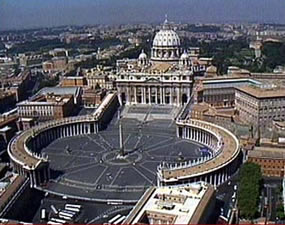 |
Vaticann City. |
In his new book that deserves a wide readership, Exploring Protestant Traditions: An Invitation to Theological Hospitality (2006), theologian David Buschart recounts a conversation with his mother when he was about ten, the gist of which was that whereas his buddies were Catholic, Presbyterian, and Methodist, his mother described his family as "just Christians." That succinct description had its merits, and it satisfied Buschart in some important ways for some time, but later he began to observe a troubling pattern among different denominations. Nearly every Christian tradition tried to "occupy an ecclesiastical or spiritual high ground," writes Buschart, "as the genuine "descendants of Jesus Christ and 'the New Testament church'"—unlike, of course, all those other posers and wannabes.
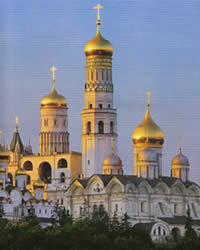 |
Orthodox churches, the Kremlin. |
Examples of this Christian superiority complex are easy to come by. The Eastern Orthodox churches confess that they alone are "the one true church of Christ on earth." In various times and ways Roman Catholics have claimed that "outside the church there is no salvation" (Extra Ecclesiam nulla salus). One of the earliest and most colorful expressions of this claim comes from Cyprian (200–258), bishop of Carthage in North Africa, who wrote that “you cannot have God for your Father unless you have the Church for your Mother.” About a thousand years later, on November 18, 1302, Pope Boniface VIII left no ambiguity in the matter when in his bull Unum Sanctum he wrote, "We declare, say, define, and pronounce that it is absolutely necessary for the salvation of every human creature to be subject to the Roman Pontiff."1
Protestants inherit the superiority complex as encoded into their theological DNA. Whereas the Orthodox and Catholic traditions place the church "above" the Bible and strictly mediate its interpretation, the Protestant Reformation—with Bibles newly translated into the common vernacular of every day people—placed the Bible directly into the hands of individual believers to read for themselves, thus placing Scripture (that is, their interpretation of it) "over" the church. This revolutionized the role of the Bible in the church, but created new problems, one of which is the Protestant inclination to radical individualism and sectarian splintering into endless new denominations, each one of which believes that it parses the truth better than the group they left. The Orthodox scholar George Florovsky called this Protestant view of Scripture the “sin of the Reformation” because it can lead to arbitrary, subjective and privatistic interpretations of the Bible. It is a short step from a legitimate personal encounter with God through Scripture, unmediated by church officialdom, to a tragic contortion of the Gospel that generates a cult or sect.
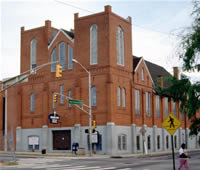 |
Ebenezer Baptist Church, Atlanta. |
Mark's Gospel this week for World Communion Sunday provides the perfect antidote for Christian oneupmanship (an oxymoron if ever there was one). Just after arguing about who among them was the greatest (Mark 9:33–37), and just before James and John ask Jesus for positions of glory (10:35–45), Mark writes that the disciples saw an anonymous healer cast out demons in Jesus's name. This person was unknown to them, and so was probably peripheral to the Jesus movement. "He was not one of us," they complained, "so we told him to stop," as if this healer needed their authorization as the sole proprietors of the mission of Jesus. Their presumption and exclusionary attitude was sadly ironic because whereas the disciples had just failed in exorcising demons (9:14–18), this healer was successful. No, said Jesus, don't stop them, "for whoever is not against us is for us." Even a simple kindness like giving someone a sip of water advances his kingdom.
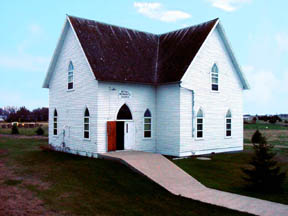 |
Bethel Mennonite Church, South Dakota. |
The two Old Testament readings this week expand Jesus's insistence that the kingdom of God grows in ways and means that we might not imagine and sometimes even try to prevent. Literary affinities lead some scholars to connect Mark's passage with the story of Eldad and Medad. When Moses appointed seventy elders, Eldad and Medad stood on the fringes of the community, "yet the Spirit also rested on them, and they prophesied." When Joshua objected, "Tell them to stop!" Moses rebuked him: "I wish that all the Lord's people were prophets and that the Lord would put his Spirit on them" (Numbers 11:24–29).
Then there is the story of the Jewish woman Esther who married the pagan king Xerxes (or Ahasuerus) of Persia, and who through bizarre circumstances thwarted Haman's genocidal plot to annihilate the Jews. Yahweh is never mentioned, never seen, and never heard from in the entire book, even though by one count the pagan king is mentioned 190 times. Further, the plot of Esther hinges on intrigue, hatred, deceit and eventual revenge by the Jews who massacred 75,000 of their enemies. Nor is there any mention of the Mosaic law, ritual purity, or the Hebrew sense of justice, mercy, and kindness. For these reasons the book of Esther has had both Jewish and Christian detractors who objected to its inclusion in the Bible. But every year since then Jews have observed the Feast of Purim "as the month when their sorrow was turned to joy and their mourning into a day of celebration" (Esther 9:22). [Cf. The Oxford Study Bible, 1991, p. 612.] God was powerfully at work even though no one ever spoke his name.
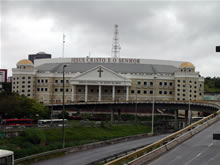 |
Pentecostal Church, Salvador. |
World Communion Sunday affords Christians an opportunity to confess our propensity to exclude people who are different from us: "He was not one of us" (Mark 9:38). Buschart invites us to what he calls "theological hospitality." Instead of defaulting to our insecurities about those whom we find strange or fringe, to ignorance, fear, and what he so aptly describes as "sincere yet uninformed stereotypes" of others, we do well to celebrate the considerable diversity that exists both within and among our Christian traditions. After all, he observes, one mark of a cult is "enforced conformity," whereas authentic Christianity celebrates genuine diversity along with our many continuities and commonalities.
For further reflection
* What experiences have you had that illustrate the fears, insecurities, and instinct for control exhibited by the disciples in Mark?
* What lessons might we take from the book of Esther about God's presence in history?
* Consider the implications of "theological hospitality."
* Do we really believe that a simple act like offering a drink to someone expresses God's kingdom, or maybe this is just a metaphor?
* See W. David Buschart, Exploring Protestant Traditions (2006), which devotes successive chapters to the history, theological method, and doctrinal distinctives of eight traditions—Lutheran, Anabaptist, Reformed, Anglican, Baptist, Wesleyan, Dispensational, and Pentecostal.
[1] Catholicism's Vatican Council II (1965) softened this claim in its Dogmatic Constitution on the Church (Lumen Gentium): "Those who, through no fault of their own, do not know the Gospel of Christ or His Church, but who nevertheless seek God with a sincere heart, and, moved by grace, try in their actions to do His will as they know it through the dictates of their conscience—those too may achieve eternal salvation" (no. 16).





